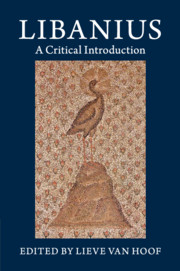Book contents
- Frontmatter
- Dedication
- Contents
- List of tables
- Notes on contributors
- Preface
- Abbreviations
- Introduction: Libanius at the margins
- Part I Reading Libanius
- Part II Libanius’ texts: rhetoric, self-presentation and reception
- Part III Contexts: identity, society, tradition
- Chapter 9 Emperors and empire in Libanius
- Chapter 10 Libanius’ networks
- Chapter 11 Libanius and the literary tradition
- Chapter 12 Libanius and the ‘game’ of Hellenism
- Chapter 13 Not the last pagan: Libanius between elite rhetoric and religion
- Epilogue Libanius at the centre
- Appendices: survey of Libanius’ works and of available translations
- References
- Index locorum
- General index
Chapter 11 - Libanius and the literary tradition
from Part III - Contexts: identity, society, tradition
Published online by Cambridge University Press: 05 October 2014
- Frontmatter
- Dedication
- Contents
- List of tables
- Notes on contributors
- Preface
- Abbreviations
- Introduction: Libanius at the margins
- Part I Reading Libanius
- Part II Libanius’ texts: rhetoric, self-presentation and reception
- Part III Contexts: identity, society, tradition
- Chapter 9 Emperors and empire in Libanius
- Chapter 10 Libanius’ networks
- Chapter 11 Libanius and the literary tradition
- Chapter 12 Libanius and the ‘game’ of Hellenism
- Chapter 13 Not the last pagan: Libanius between elite rhetoric and religion
- Epilogue Libanius at the centre
- Appendices: survey of Libanius’ works and of available translations
- References
- Index locorum
- General index
Summary
Introduction
Quellenforschung, a mainstay of philological studies in the nineteenth century, has long since gone out of favour, but it may be considered an important ancestor of today’s intertextual studies or ‘intertextuality’: both Quellenforschung and intertextuality deal with the relationship(s) between older and more recent texts, but while nineteenth-century Quellenforscher were more interested in reconstructing sources, thus privileging the older – and most of the time lost – texts over the more recent ones, intertextuality focuses on the reception and significance of sources for a new text, thus giving this text its due, while not neglecting the traditions it builds on. Having thus inherited Quellenforschung’s diachronic perspective, but turning it to a new purpose, intertextuality provides important answers to significant questions: what an author or people in a certain era thought were important literary examples to use, or which previous authors an author could suppose (or would at least like) his readers to know. The conscious (re-)use of earlier texts often adds extra layers of meaning to what an author wants to say, because a quote or an allusion points the reader or listener to the original context of the quote or allusion, thus evoking associations which he would not notice if the quote or allusion was not there or went unnoticed.
- Type
- Chapter
- Information
- LibaniusA Critical Introduction, pp. 241 - 267Publisher: Cambridge University PressPrint publication year: 2014
- 2
- Cited by



